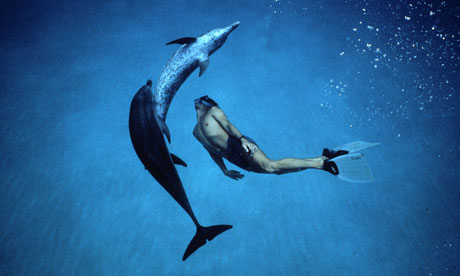
The final, compelling message of True Stories: Dolphin Boy (More4), the one that made me ashamed that I didn't already know it, was how much devastation one act of violence wreaks upon one human being. I've become so accustomed to thinking of an adult – even a young adult – as essentially finished, inviolable, that I had no concept, and certainly no ready image, of how fragile is the psyche. Morad was 17 when the brother of his female classmate, along with three friends, took him to a warehouse in his village in northern Israel and beat him almost to death. Some imagined impropriety between Morad and the sister had occurred: the details of this gruesome event were kept gracefully brief, but the economy of the telling made it more horrific, its features blurred and shifting, like a nightmare.
The first shot we see of this young man is three weeks after the attack. He's sitting in the office of Dr Kutz, a specialist in post-traumatic shock who types his rhetorical questions on to a computer screen, in an echo of Sex and the City of which he must surely be unaware. Morad is mute, he won't focus, he is "in a state of profound post-traumatic dissociation": in effect, he separated himself from his body during the attack, and cannot reunite these elements. His distress is silent but painfully visible, except when he goes home, when he flies into rages. On the eve of hospitalising him, Kutz suggests dolphin therapy.
Now, if I'm honest, there is nothing here that shunts dolphins up the therapeutic-food-chain for me. There is talk of how our gestation in water is mimicked by a friendly experience in the ocean, so that we might become reborn by a dolphin attachment, but this seems a little tenuous. Kutz talks of the "miraculous transforming power of nature and of love", but why dolphins? Why not horses? If anything, what this underlines is how little we understand the brain; how far we are prepared to take our smallest hunches in order to help one another; and how much sheer love there is between strangers, that they might find encouragement in the smallest improvement, and encourage one another with their optimism. And that's a tearjerker before you even bring in Morad's parents. Almost everything his father said reduced me to tears; when it came to his short soliloquy ("I love you . . . I love you . . . You are my soul") I needed dolphin therapy just to sort my mascara out.
There is a subtle structural brilliance to this tale, in so far as it seems straightforward and chronological, but each act, a perfect third, closes with a thud of despair: after a year with the dolphins, this previously silent boy is laughing and saying he's having fun. But he has buried his former life, claims to have been born in Eilat (500km from his home) and will not see his mother. After another year, he has a girlfriend and a beautiful life but says: "If this would heal me, then I would be able to sleep like you at night. It does not heal me." Another year goes by, and he still has flashbacks and depression. He hits 21, and returns to his village: his progress has been astonishing, but it never eclipses the outrage that was committed against him. This is not a feelgood film. I felt that its agenda – the elaborate adoration of these daft, well-meaning dolphins – was an attempt to make it more uplifting, which was unnecessary. Something can deepen your understanding without making you feel good.
And that's pretty much what the Californians are finding with Jamie Oliver. He is attempting a variant of his pioneering school dinner work in Jamie's Food Revolution Hits Hollywood (Channel 4), except that the local authority won't let him into a single school. Instead, the parents come to him, sometimes in small numbers (at his studio event, he showed them what went into processed burgers), and sometimes in numbers so tiny you could fit them round a dinner table. He showed them how much sugar the kids of the district eat in a week, by filling a school bus with sugar. Never mind the meaning. This was the brainchild of a man who just wanted a go on some industrial machinery.
As well-disposed as I am towards him – and I am when I see him far from home and in jeopardy – I can't help thinking, what would we do, if Martha Stewart (say) came over here, and wanted to caper through our schools, telling us what to do? Would the local authority let her in, or would they tell her where to stick it?

